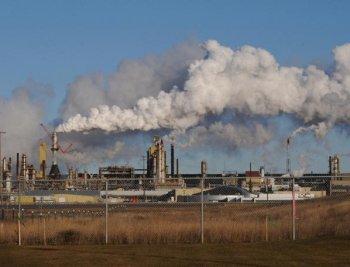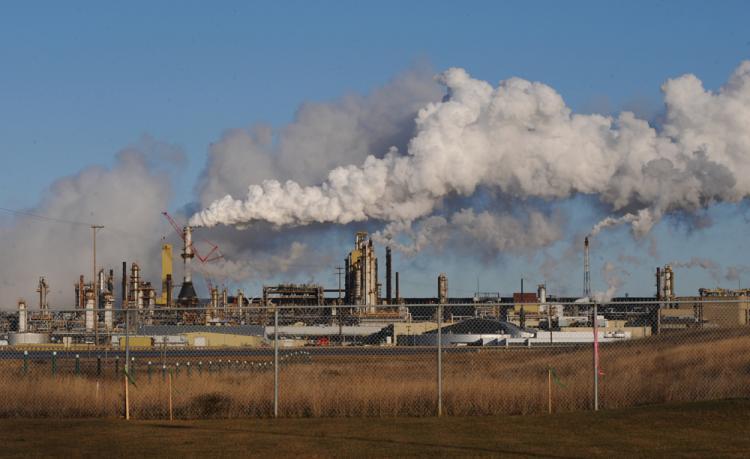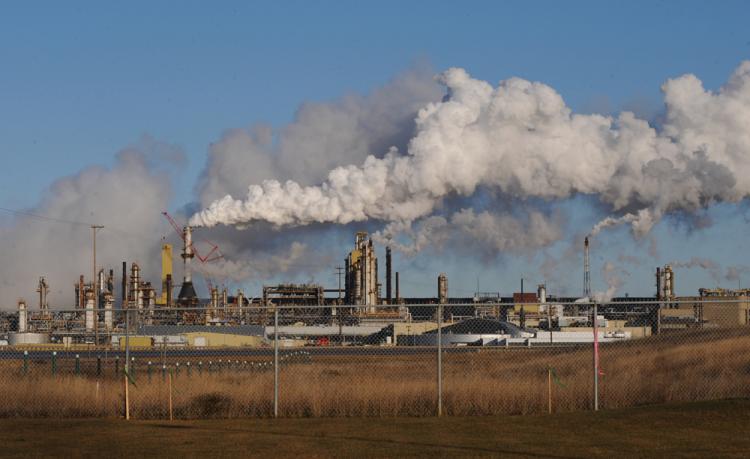In the ongoing pro- and anti-oil sands battle, an Alberta lobby group is proposing a counter-boycott after popular U.S. clothing manufacturers announced they will avoid fuels that originate in the oil sands.
Alberta Enterprise Group (AEG) is urging a boycott of all Gap, Levi Strauss, and Timberland products in response to what it calls the retailers’ “unfair and misguided” position on the oil sands.
The companies, along with Walgreens drugstore chain, have joined several other corporations that have said they would avoid using oil sands-related gasoline as way to reduce their carbon footprint.
However, made-in-Asia Gap products often travel over 10,000 km from manufacturing plants before arriving in Alberta, said AEG, “emitting thousands of tonnes of carbon dioxide and using oil from the Middle East and Africa along the way.”
“The greenest Gap store is no Gap store,” said AEG president Tim Shipton in a press release. “Clearly, closing Gap and affiliated Old Navy and Banana Republic stores is one of the best hot air reduction opportunities we have right now.”
Gap, Old Navy, and Banana Republic have 26 Alberta store locations in Red Deer, Edmonton, and Calgary.
AEG claims the retailers are boycotting the oil sands in a PR move to appear more “green” and accuses the companies of greenwashing while their products are made under questionable labour practices in Asia.
“Gap, a company that is regularly accused of using unethical labour practices in developing countries to produce its stock, wants the world to buy bloody oil from Nigeria and the Middle East,” said Shipton.
“It’s high time for Albertans to say no way.”
According to news reports, the retailers’ boycott was prompted by an ongoing campaign in Britain and the U.S. by Corporate Ethics International, a San Francisco-based environmental organization that has been urging tourists to “RethinkAlberta” as a desirable place to visit because of the oil sands.
The campaign has angered Albertans, including industry officials, politicians, and business groups, which in turn have called for a boycott of U.S. products.
However, the Canadian Association of Petroleum Producers told the Calgary Herald that while it shared AEG’s sentiment, it was disappointed by businesses’ “knee-jerk reactions” to pressure from activist groups.
“We’ve been talking to a lot of global transportation providers and retailers and a lot of them understand the complexities of not only oilsands, but about removing any type of fuel from the fuel supply. And they want to work with us to find solutions rather than simply make a PR statement about a boycott,” said spokeswoman Janet Annesley.
Sierra Club executive director John Bennett told the Herald that accusations that corporations became involved in the campaigns to seem more environmentally friendly is irrelevant.
“I don’t think it’s important at this stage whether companies are doing this because they’re jumping on a bandwagon to look good. The only question for us is are they actually doing something, and the answer is yes,” Bennett said.
“We think this is another indication of the effectiveness of talking about the need to have clean production and start phasing out the most carbon-intensive forms of fossil fuels, so it’s very positive for us.”
Alberta produced approximately 1.9 million barrels of crude oil per day in 2009, of which about 1.5 million barrels were exported south of the border, accounting for 15 percent of crude oil imports in the U.S.
The U.S. Midwest is particularly reliant on western Canadian crude, with one-third of the crude oil supply in 15 states coming from western Canada, according to AEG.
“Walgreens stores in the Midwest will need to avoid all Canadian crude—one-third of the supply—to comply with its no-oil sands policy. We hope all those delivery trucks have one very special and magical pump,” Shipton said.
Alberta Enterprise Group (AEG) is urging a boycott of all Gap, Levi Strauss, and Timberland products in response to what it calls the retailers’ “unfair and misguided” position on the oil sands.
The companies, along with Walgreens drugstore chain, have joined several other corporations that have said they would avoid using oil sands-related gasoline as way to reduce their carbon footprint.
However, made-in-Asia Gap products often travel over 10,000 km from manufacturing plants before arriving in Alberta, said AEG, “emitting thousands of tonnes of carbon dioxide and using oil from the Middle East and Africa along the way.”
“The greenest Gap store is no Gap store,” said AEG president Tim Shipton in a press release. “Clearly, closing Gap and affiliated Old Navy and Banana Republic stores is one of the best hot air reduction opportunities we have right now.”
Gap, Old Navy, and Banana Republic have 26 Alberta store locations in Red Deer, Edmonton, and Calgary.
AEG claims the retailers are boycotting the oil sands in a PR move to appear more “green” and accuses the companies of greenwashing while their products are made under questionable labour practices in Asia.
“Gap, a company that is regularly accused of using unethical labour practices in developing countries to produce its stock, wants the world to buy bloody oil from Nigeria and the Middle East,” said Shipton.
“It’s high time for Albertans to say no way.”
According to news reports, the retailers’ boycott was prompted by an ongoing campaign in Britain and the U.S. by Corporate Ethics International, a San Francisco-based environmental organization that has been urging tourists to “RethinkAlberta” as a desirable place to visit because of the oil sands.
The campaign has angered Albertans, including industry officials, politicians, and business groups, which in turn have called for a boycott of U.S. products.
However, the Canadian Association of Petroleum Producers told the Calgary Herald that while it shared AEG’s sentiment, it was disappointed by businesses’ “knee-jerk reactions” to pressure from activist groups.
“We’ve been talking to a lot of global transportation providers and retailers and a lot of them understand the complexities of not only oilsands, but about removing any type of fuel from the fuel supply. And they want to work with us to find solutions rather than simply make a PR statement about a boycott,” said spokeswoman Janet Annesley.
Sierra Club executive director John Bennett told the Herald that accusations that corporations became involved in the campaigns to seem more environmentally friendly is irrelevant.
“I don’t think it’s important at this stage whether companies are doing this because they’re jumping on a bandwagon to look good. The only question for us is are they actually doing something, and the answer is yes,” Bennett said.
“We think this is another indication of the effectiveness of talking about the need to have clean production and start phasing out the most carbon-intensive forms of fossil fuels, so it’s very positive for us.”
Alberta produced approximately 1.9 million barrels of crude oil per day in 2009, of which about 1.5 million barrels were exported south of the border, accounting for 15 percent of crude oil imports in the U.S.
The U.S. Midwest is particularly reliant on western Canadian crude, with one-third of the crude oil supply in 15 states coming from western Canada, according to AEG.
“Walgreens stores in the Midwest will need to avoid all Canadian crude—one-third of the supply—to comply with its no-oil sands policy. We hope all those delivery trucks have one very special and magical pump,” Shipton said.






